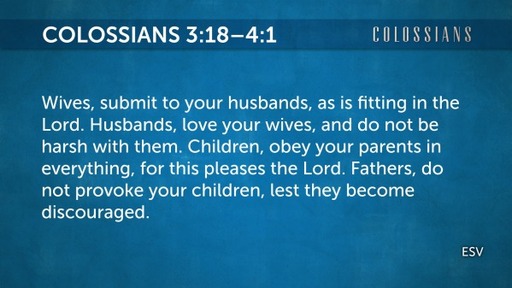RELATIONSHIP RULES

I. HUSBANDS AND WIVES
To “submit” is to recognize a relationship of order established by God. But submission to any human is always conditioned by the ultimate submission that each believer owes to God: in any hierarchy we can imagine, God stands at the “top of the chart.” This means, then, that a wife will sometimes have to disobey a husband (even a Christian one) if that husband commands her to do something contrary to God’s will. Even as she disobeys, however, she can continue to “submit,” in a sense, by recognizing that her husband remains her head—just not her ultimate head.
Perhaps this pattern reflects the particular susceptibilities of each partner in the relationship: wives may be tempted to chafe under the “headship” of their husbands; and husbands are prone to abuse their leadership role. Whatever the explanation, the command that husbands love their wives introduces a somewhat revolutionary note of reciprocity that is a hallmark of this household code.
II. PARENTS AND CHILDREN
III. SERVANTS AND MASTERS
To understand NT texts mentioning slavery, one must keep in mind major factors that distinguish first-century slavery from that later practiced in the New World. (1) Race differences played no role, and an enslaved person generally could not be distinguished by appearance. (2) Education was encouraged and enhanced a slave’s value (some slaves were better educated than their owners). (3) Many slaves functioned in sensitive and highly responsible positions (see Phil. 4:22: “those of the emperor’s household,” some of whom were Christians). (4) Persons sometimes sold themselves into slavery to escape poverty, pay debts, climb socially, and obtain special jobs. (5) Slaves could control property (including owning their own slaves). (6) Slaves’ cultural and religious traditions were largely those of the free. (7) No laws prevented public assemblies of slaves. And (8) the majority of urban and domestic slaves could anticipate being set free (manumitted) by age thirty, becoming “freedmen” or “freedwomen” (1 Cor. 7:21–23; Acts 6:9).
